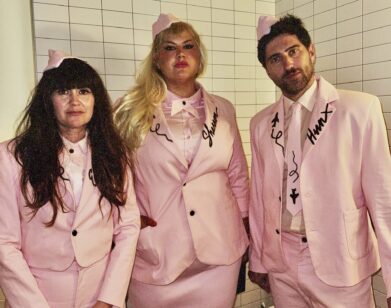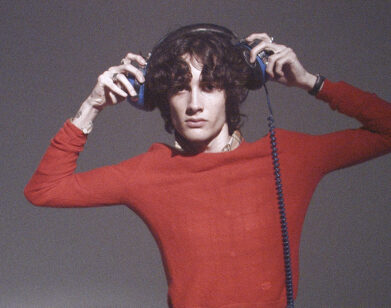Kindness Returns
In considering the two years that have passed since Kindness‘ debut album, World, You Need a Change of Mind, it’s tempting to draw a connection between that title and the opening lyrics of Otherness, his sophomore album: “I felt the world restart; I felt the world begin.” Initially, it feels steeped in optimism, as Adam Bainbridge, the man behind the solo project, continues singing, backed up by Kelela and Ade as well as a crisp, poppy trumpet line. As Otherness progresses, however, it becomes clear that Bainbridge is aiming for something more complicated than a setup and resolution, bringing in friends and collaborators like Robyn, Blood Orange’s Devonté Hynes, and M.anifest.
“I mean, I could’ve called it World, You Still Need a Huge Fucking Change of Mind,” Bainbridge said wryly, when he spoke with Interview before the album’s release in early October. “I never found a way to express, succinctly, non-preacherly, those kind of sentiments in lyrics, so everything’s really blurred, but it’s there. I think even ‘World Restart’ is kind of saying we could all take the first line initiative to wipe the slate clean and start again.”
Otherness layers a variety of the pop and R&B elements at Bainbridge’s disposal: bright horns, twinkling synths, piano lines deployed both as clear, delicate melody drivers and distorted background winks, a surprising Herbie Hancock sample, and, of course, the guest vocalists. “Who Do You Love?,” featuring Robyn, is a standout track, so check out the video below and an exclusive behind-the-scenes photo of Bainbridge with Robyn above. We met Bainbridge for a late lunch at an Indian restaurant in the Flatiron District in Manhattan. He was due to share a DJ bill with Hynes later that night.
ALEXANDRIA SYMONDS: Is it hard to DJ on a full stomach?
ADAM BAINBRIDGE: I think it’s hard to DJ, full stop.
SYMONDS: [laughs] How are you and Dev splitting the duties tonight? Is it just an hour of each of you?
BAINBRIDGE: I think we’ll just improvise. I have no idea. I think we’ll possibly have a third member of the party in the mix.
SYMONDS: You and he have been friends for over a decade, and he guests on this album. How do you feel like your existing relationship with him shapes the music that you made together? Is there a shorthand? Are you able to work more quickly because you know each other so well?
BAINBRIDGE: Definitely, yeah. The two 50-50 co-writes we’ve done, “On the Line” for his record and “Why Don’t You Love Me” for my record, both were done in a day—start to finish, everything. It was one of the easiest, most organic sessions that I’ve ever done with anyone; it just seemed to keep moving forward, there wasn’t a lot of discussion. We haven’t written that way together very much. It helped that it was in a closed studio [with] an engineer recording everything we needed and other musicians in the room contributing, while we focused on the song. There’s definitely an easier process, because we don’t need to discuss anything at this point. We know what each other like.
SYMONDS: There’s a line that’s repeated in the song “Geneva”: “If you could read my mind, you know what you’d find.” Do you think there’s a psychic element that emerges after a certain amount of time with a person?
BAINBRIDGE: I think at the time it just rhymed well.
SYMONDS: [laughs] Okay.
BAINBRIDGE: I think the unexpected from people is the best thing about them, and that includes collaborators, relationships, love affairs, and all that stuff. The more that you come together as people, though, the psychic thing you were describing is more of a feeling. It becomes this space where you can make things together, and sometimes it takes time to move to that space. Myself and Robyn, we just talked and drank and went to dinner before we thought about working on our own, the two of us. Not that there was pressure there, but I think there has to be a kind of intimacy where you know someone well enough to know when they’re unhappy and what you can do to change that. People have to want the same thing. People have to want the song to be finished–sometimes that’s the hardest part, accepting that this thing is done and you have to let go.
SYMONDS: Right.
BAINBRIDGE: You maybe even need to be in the room for the same reasons. It can happen that you work with artists whose reasons for asking you to work with them are so completely the wrong ones.
SYMONDS: Like what?
BAINBRIDGE: I have this discussion a lot with other writers and producers. This hasn’t happened to me, but I remember someone saying the other day, something like, “We love what you do. You’re the only person that can do that thing, but can you do something that sounds like somebody else for this project?” The weight of it was unbearable, and I think he said, in that case, no. I had an argument with a group once. We had been going round and round and round, people describing what they wanted the music to sound like, where the ethos of the project was coming from. And I said, “You know what, guys, I’m not sure this is going to work. If we can’t have a decent conversation about something that isn’t music, I don’t think we can stand to be around each other. Let’s talk about books or food, cinema, or something. If you can’t even be passionate about what was on TV last night, if the world ends at the exit door to this studio, then I don’t think we have enough to write about in the first place.
SYMONDS: One thing that I really appreciated about this album was that I don’t think you pigeonholed anyone you worked with into the CliffsNotes version of what they do–you put Robyn on a lovely ballad, instead of an upbeat dance jam, and put Kelela against something jazz-inspired instead of these driving Night Slugs tracks.
BAINBRIDGE: There’s two reasons for it. One is, it’s my party, and I make the rules.
SYMONDS: Of course. [laughs]
BAINBRIDGE: Brackets: “[Said with a smile, not like a dictatorial bastard.]”
SYMONDS: “He’s standing up, and he just slammed his fists on the table.”
BAINBRIDGE: “Smashing a paperweight.” The other one is that they do their thing way better than I could. I think the more interesting thing is to try and meet someone in the middle. We can take their idiosyncrasies and my truck-fulls of weird musical hang-ups and come together all on one page. I hope it was exciting for them, too. I know that Robyn found a kind of liberation in working with someone so chaotic. There was a point in the process of doing the remix I just did for Röyksopp and Robyn where I wrote to them and said, “I don’t know if this is working. That’s why I hate remixes–I don’t know if it sounds clear enough, I think it sounds too much like chaos.” And she texted back, “No, but that’s what I love about what you do, chaos.”
SYMONDS: Did you find a way to take that as a compliment?
BAINBRIDGE: If that’s why she wants to work with me, then chaos she shall get.
SYMONDS: [laughs] Can you expand at all on “weird musical hang-ups”? Do you have personal rules?
BAINBRIDGE: I have a few. Obvious stuff. I would hope there’s a lot of people in music who would think the same way. I’m sure there’s jazz cats that have far more nuanced versions of what I think, but for me there’s certain chord and note progressions that always work–and that’s the reason not to use them. There’s Wikipedia pages about these chord progressions, and you hear them a lot. You’ll know it when you hear it. It’s four chords, with that Dr. Luke, Kelly Clarkson thing going on, and it’s just too easy. Part of the challenge is making difficult things listenable to an audience that doesn’t necessarily want to listen to difficult things. I mean, I like Kelly Clarkson, but I’m just saying when song after song after song is engineered to elicit response, after a while it doesn’t seem like professional songwriting, it feels like cynicism. If you start talking about the technicalities of things, people start sounding kind of up their own ass, which is kind of what I’m doing.
SYMONDS: I think the alternative is “I don’t think at all about what I do,” which isn’t good either.
BAINBRIDGE: There’s limits. I think even people that are fans of musicians don’t necessarily want to hear them being ponderous and heavy about those things. It’s almost better when people think it happens magically in a forest somewhere, which I think is a clever mythology that certain artists have created.
SYMONDS: When you requested the Herbie Hancock sample on the record, did you go about it in a way different from the normal process of getting a sample?
BAINBRIDGE: My manager always tries to find a telephone number and call someone up, and in the case of Foday Musa Suso, who’s the other player on that Herbie Hancock record, he actually found his telephone number on Google as the first result, which was a shock. He said, “Sure that sounds great! Let’s do it. Do you want me to speak to Herb for you?” “Well, that’d be useful.” That’s kind of what propelled things forward, and then we just exchanged a few emails.
SYMONDS: How did you come across it in the first place?
BAINBRIDGE: That’s what’s funny–I found it on YouTube, listened to it a lot and didn’t want to touch it because the song was so immaculately perfect. While recording with Solange, we were in a record store and I was flipping through some crates for things to sample for her and it was really just sitting in the front of a rack. I knew in the back of the studio there was a turntable plugged into the mixing desk, all ready to go, and I thought, “Eh, all right. We’ll do this.” I pulled that and a bunch of other things, recorded it, and then left it for a long time, until I read The New York Times article, which kind of inspired all these lyrics. We did it all so fast. I remember Kelela coming into the studio, and I just had just finished recording my vocal part and said, “This song just happened. Do you want to get in on this?” She listened to it and just improvised around the lyrics, first take, that’s it. Her first part in “Geneva,” that was the very first time we met each other. She came to the studio, sat in the back of the room with a stage mic, and we turned all the lights down, and she sang just whatever came to her, without hearing the music ever before and maybe never repeating it again. “Geneva” really is her reacting to it for the first time. Every part of that chord progression is her hearing it for the first time and letting go. I think we were feeling very much in this room together, the electricity of it. I loved that that happened.
OTHERNESS IS OUT NOW VIA FEMALE ENERGY RECORDS. FOR MORE ON THE ARTIST, VISIT HIS FACEBOOK PAGE.







